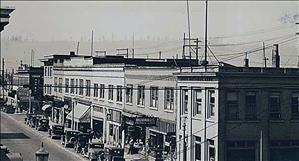On June 22, 1920, one of the last Chautauquas in Puget Sound is held for six days in Auburn. Named after Chautauqua, New York, where it was founded in 1874, the movement is a summertime presentation of lectures, discussions, and cultural activities lasting several days to a week in a resort atmosphere.
Days before the event, an 80 X 100 foot tent was erected on the Central School grounds with permission of the school board. Support for the Chautauqua was widespread, with religious, business, and community leaders urging all to come see a fine slate of lecturers, humorists, entertainers, and musicians. Tickets sales kicked off sluggishly, but as word spread, seating came into in great demand.
One, Two, Three
On the morning of June 22, a procession of 50 children, “in costumes unique, ornate, and grotesque,” paraded through the streets of Auburn chanting, “One, two three! What are we? Chautauqua!” An auto parade followed soon after, leading people to the tent.
The day’s events began with an introduction by Committee Chairman M. E. Brewer, followed by a history of the Chautauqua movement. Then the real program began with a performance by the Ithican Male Quartet, a bunch of college fellows in natty summer clothes and full of pep. The quartet also performed in the evening, along with Elise Mae Gordon, who performed impersonations. The crowd enjoyed hearing her dialect stories, especially ones in her “down South negro brogue.”
The next day’s highlight was a speech by Mr. Wood Briggs, entitled “Playing the Game.” Briggs, a cultured gentleman from Kentucky, advocated a get-together spirit, and the combination of courage, strength, and a well trained mind need to play in the game of life. In the evening, the Davies Singers entertained all with a fanciful production of the light opera The Mikado.
Tolstoy and Powdered Wigs
Thursday saw entertainment by the Scott Highlanders, and a lecture by Mae Guthrie Tongiet entitled, “Shasta Daisies and Folks.” But the most notable speaker of the entire Chautauqua came that evening with a lecture by Count Ilya Tolstoy, son of noted writer Leo Tolstoy. Count Tolstoy, a fierce anti-Bolshevik, orated about life in Russia.
On Friday, concerts were held by the Old Colonial Band, a six-piece brass ensemble made up of men in powdered wigs and colonial-era garb. In the evening vocalist Loraine Lee accompanied them. On Saturday, The Spragues provided entertainment, and W. H. Nation gave a lecture on community problems entitled, “What I Think of Your Community.”
Thomas McClary spoke on Sunday in a talk entitled “The Mission of Mirth.” The six-day event closed with a performance by the St. Cecelia Singing Choir, which promoters assured Chautauqua-goers would not yield a “draggy minute” during the last night.
Throughout the week, the Junior Chautauqua kept youngsters busy with games, songs, and stories by the “Chautauqua Lady.” At the end of the week, promoters barely broke even, but a good time was had by those who bought tickets at $2.75 a pop ($1.10 for students). Chautauqua vanished from Puget Sound and from the nation during the 1920s, although there have been several small revivals since.

